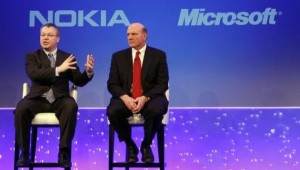Microsoft announced Monday that it will purchase Nokia’s devices and services business, as well as license Nokia patents and a mapping service, in a deal worth 5.44 billion euros (roughly $7.18 billion). Microsoft expects the deal to be finalized in early 2014.
Microsoft’s acquisition of Nokia’s devices business marks the end of an era for Nokia, once a leader in the mobile-phone space – and the beginning of another for Microsoft, as it becomes a smartphone (and likely “dumbphone”) maker and takes control of an organization that has for years produced the most popular Windows Phone devices.
Here are four ways Microsoft’s planned Nokia purchase could have far-reaching effects on Microsoft, Nokia, BlackBerry, feature phones and, potentially, the entire mobile industry.
1) End of One Era, Beginning of Another
This is effectively the end of Nokia as we know it.
The company, which played an undeniable roll in the development of the modern mobile market, is far from “dead,” and it will continue to operate its networks and mapping business. It still owns its patents, too; Microsoft is licensing them, along with many other tech companies.
But Nokia phones are no more. You’ll never see another Nokia smartphone, according to The Verge. (I’m not so sure that’s the case; Nokia was likely working on other smartphones when the deal was made, and another device – possibly the rumored Lumia 1520 “Bandit” – could be released before the acquisition is finalized. But the point is the same: If the deal is finalized, Nokia phones will be more.)
At first glance, it seems like a smart move for Microsoft, which clearly has the funds to make such a purchase without much of an effect on its bottom line. I’ve long said that the best thing about Windows Phone devices is the Nokia hardware. Assuming the deal goes through, Microsoft will be the new owner of a very impressive hardware maker. That’s unquestionably a good thing for Redmond, which has had its fair share of hardware struggles in the past.
Microsoft expects to be able to make up to four times more profit in the future on Nokia-made Windows Phone devices as it would if it didn’t own Nokia technology. And as a handset maker, Microsoft will have more incentive to improve Windows Phone hardware and software integration.
Smart move or not, the deal won’t necessarily make Windows Phone a true iOS or Android competitor. It’s not just about good hardware or good software or integration anymore, and Microsoft faces a number of other challenges in mobile – not the least of which is a major image issue. Microsoft also has some very ambitious goals: It wants to quadruple Windows Phone market share by 2018, according to Engadget.
2) Nokia Is to Microsoft as Motorola Is to Google – With One Big Difference
Last spring, Google announced that it had finalized its deal to acquire Motorola Mobility, Motorola’s handset division. In some ways, Microsoft’s planned acquisition of Nokia looks like a very similar move.
But Microsoft and Google are two very different companies. Google’s Motorola buy hasn’t exactly helped it excel in the handset space – not yet, at least. In fact, Motorola just announced its first new lineup of phones since the Google buy in July. Honestly, the new devices aren’t particularly impressive. The Moto X looks to be a step in the right direction, but it’s a small step.
It took more than a year to see the fruits of Google’s Motorola acquisition, so it could be even longer before we see the results of Microsoft’s Nokia, which is not yet official.
The Nokia deal signifies a Google-like approach to the smartphone ecosystem from Microsoft; other handset makers can still build devices that run Windows Phone software, but Microsoft will work closely with its own handset division to build hardware that’s deeply integrated with the Windows Phone OS, presumably giving it an advantage over hardware partners.
However, Google has Samsung as an external partner. Samsung is the largest handset manufacturer in the world and maker of the world’s most popular lineup of Android devices, the Galaxy series. In other words, it’s a very powerful partner and one that’s helping to make Android even more popular, regardless of what Google itself does with the mobile OS.
By acquiring Nokia, Microsoft is swallowing its most successful handset partner. Samsung makes Windows Phone devices, but those handsets aren’t nearly as popular as its Galaxy Android phones, and as such, it’s safe to say that Samsung is not as invested in Windows Phone as it is in Android. HTC, another popular handset maker, also offers Windows Phone options but appears more invested in Android, thanks in large part to is popular HTC One smartphone.
Microsoft doesn’t have Samsung’s Galaxy success to fall back on. In a way, it’s betting the farm on Nokia, because HTC, Samsung and other Windows Phone partners could potentially be turned off by its sidling up to Nokia.
3) Microsoft-Nokia Deal Puts BlackBerry in Even Tougher Spot
BlackBerry and Nokia were both kings of mobile in the not-too-distant past. Until today, both faced similar situations in modern mobile. Both companies are not seeing the handset sales they need to justify and maintain significant investments in their hardware businesses; consumer loyalty and interests are waning, and both are investigating strategic alternatives.
A significant difference is that Microsoft just found its new handset strategy. Now BlackBerry has one fewer potential buyer/investor. To be clear, Microsoft did not buy Nokia outright; it purchased a few attractive pieces of the company and licensed patents for a limited time instead of buying them outright, thereby reducing the risk and the cash it needed to hand out for patents.
BlackBerry is likely looking into a similar sale, but it has something very different to offer along with its handset operations and patent collection: Its enterprise business. Microsoft, with its clear history catering to businesses, seemed a possible BlackBerry buyer, but such a deal is now more unlikely. Microsoft could potentially purchase BlackBerry’s enterprise-specific offerings and buy or license patents, but that’s less likely than it was just a week ago, thanks to Microsoft’s investment in Nokia. In other words, BlackBerry finds itself in an even tougher situation. Not only is it less likely to find a buyer or partner in Microsoft, BlackBerry also now faces a more formidable competitor in Microsoft, which could ramp up its efforts to steal away enterprise customers instead of buying them.
4) Microsoft, ‘Dumbphones’ and Potential Windows Phone Growth
In addition to Nokia’s smartphone-manufacturing operations, Microsoft is also planning to acquire the company’s ‘dumbphone,’ or feature phone, operations. Smartphones are already predominant in the North American market, but feature phones are alive and well in geographic areas where it will be years, if not decades, before wireless technology advances to the point of smartphone ubiquity.
Nokia still sells a whole lot of feature phones, and Microsoft knows this. There’s a huge market opportunity for low-end, low-cost devices, and it will be interesting to see where Microsoft goes from here and how (and when) it attempts to transition Nokia’s feature-phone business and customers over to Windows Phone devices.
If executed effectively, Microsoft’s feature-phone play could prove to be a quiet way to significantly grow Windows Phone market share and customer loyalty outside of North America. Such a strategy wouldn’t be enough on its own to make Windows Phone a significant iOS or Android rival, but it could be a new foothold for the OS in areas where Microsoft does not currently have a presence.
It’s unclear what exactly the future holds for Microsoft and for Nokia, but if nothing else, today’s announcement signals a new charge by Microsoft to challenge Apple and Google and battle back what is clearly an impending mobile duopoly.





